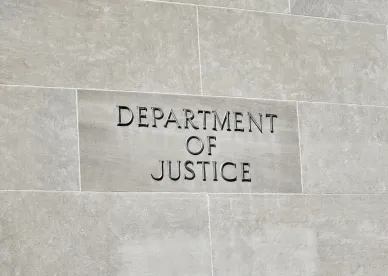On March 3, 2022, at the 37th Annual American Bar Association Criminal Justice Section National Institute on White Collar Crime in San Francisco, Attorney General Merrick B. Garland emphasized that “the prosecution of corporate crime is a Justice Department priority.” In 2021, the U.S. Attorneys’ Offices charged 5,521 individuals with white collar crimes – a 10 percent increase over 2020. In 2021, the Department of Justice’s (DOJ) Fraud Section publicly charged 333 individuals, convicted 296 individuals by plea, tried 23 cases in 18 districts, and secured convictions of 30 individuals at trial. Attorney General Garland made clear that this upward trend will continue: “the Department’s first priority in corporate criminal cases is to prosecute the individuals who commit and profit from corporate malfeasance” since these cases offer the “best deterrent to corporate crime.”
Accordingly, Attorney General Garland announced that DOJ is marshaling its resources to enable it to successfully prosecute corporate crime. These efforts include:
- A 2022 budget increase for the Justice Department’s corporate criminal enforcement efforts that will extend to 94 U.S. Attorneys’ Offices, as well as to the Criminal, Antitrust, Tax, and Environment Divisions.
- An additional $36.5 million for the U.S. Attorneys’ Offices and the Criminal Division to bolster efforts to combat “pandemic-related fraud.”
- The hiring of 120 additional attorneys to execute the Justice Department’s mission to combat white collar crime, on top of 34 attorneys the Criminal Division’s Fraud Section hired in 2021.
- An additional $325 million to fund more than 900 FBI agents to support the FBI’s White Collar Crime Program.
Attorney General Garland described the following efforts as “force-multipliers to our prosecutors and agents” and focused on:
- Partnerships at every level of government and around the world.
- An interagency task force to hold accountable Russian oligarchs and others who seek to evade U.S. sanctions or otherwise profit from corrupt conduct.
- A chief prosecutor to lead specialized teams dedicated to combatting pandemic fraud and supplement the efforts of the COVID-19 Fraud Enforcement Task Force that was established last May. The task force, led by the Deputy Attorney General, includes nearly 30 agencies that administer and oversee pandemic relief funding, including the Labor Department, the Treasury Department, the Small Business Administration, the U.S. Postal Inspection Service, and the Pandemic Response Accountability Committee.
- An increased role for Inspectors General across the federal government to identify perpetrators of health care fraud, procurement fraud, and “every other kind of government-program fraud.”
- Strengthened partnerships with the SEC on everything from securities fraud to violations of the Foreign Corrupt Practices Act (FCPA), as well as the Commodity Futures Trading Commission (CFTC), the Centers for Medicare & Medicaid Services (CMS), the Defense Criminal Investigative Service (CIS), and the Internal Revenue Service (IRS).
- The use of data analytics to identify payment anomalies that are indicative of fraud.
- A new, embedded squad of FBI agents in the Criminal Division’s Fraud Section to further strengthen its ability to bring data-driven corporate crime cases nationwide.
Attorney General Garland also reiterated restored prior DOJ guidance making clear that, to be eligible for any cooperation credit, companies must provide the Justice Department with all non-privileged information about individuals involved in or responsible for the misconduct at issue. “This means all individuals, regardless of their position, status, or seniority, and regardless of whether a company deems their involvement as ‘substantial,’” said Attorney General Garland.
Assistant Attorney General Kenneth A. Polite, Jr. recapitulated this point in his keynote remarks at the conference as well: “The carrots and sticks of our corporate enforcement program are attempting to affect, punish, deter or change the decision-making and actions of individuals. When you are asked about remedial action, and you’re asked about corporate leadership and personnel, we are doing so to ensure individual accountability.”
Here are five takeaways from these significant DOJ corporate criminal enforcement announcements:
- Expect the crackdown on all forms of pandemic-related fraud, particularly as related to Coronavirus Aid, Relief, and Economic Security (CARES) Act programs like the Paycheck Protection Program and the Provider Relief Fund, to continue.
- The Department’s Antitrust Division is back — and investigating and prosecuting price-fixing and other criminal violations. Last year, the Division brought 25 criminal cases against 29 individual and 14 corporate defendants, and has “146 open grand jury investigations — the most in 30 years.” The Antitrust Division is now trying or preparing to try 18 indicted cases against 10 companies and 42 individuals, including 8 current or former CEOs or company presidents.
- Expect more investigations and prosecutions from the Justice Department’s Environment and Natural Resources Division, which is also “prioritizing the investigation and prosecution of individuals who commit and profit from corporate environmental malfeasance.” The Division is currently trying or preparing to try 11 indicted cases against 11 companies and 34 individuals – including 14 current or former company executives – for a wide range of criminal environmental offenses.
- Womble Bond Dickinson predicted many of these enforcement trends last year. Companies and individuals should be mindful of these enforcement areas and a continued DOJ focus on corruption, especially in Latin America, health care fraud, criminal tax and cyber offenses. Strong compliance programs must be top-down, with C-suite executives emphasizing the importance of compliance. Should problems occur, the first call always should be to legal counsel, and every company should have a plan in place to address a possible criminal investigation. An active crisis is not the time to formulate a plan.
- Most importantly, Attorney General Garland’s remarks echoed announcements by the Deputy Attorney General in October and reflected a return to prior DOJ guidance on seeking individual accountability in corporate criminal enforcement. The Attorney General warned that “enforcement activity will only accelerate as we come out of the pandemic.”







 />i
/>i

